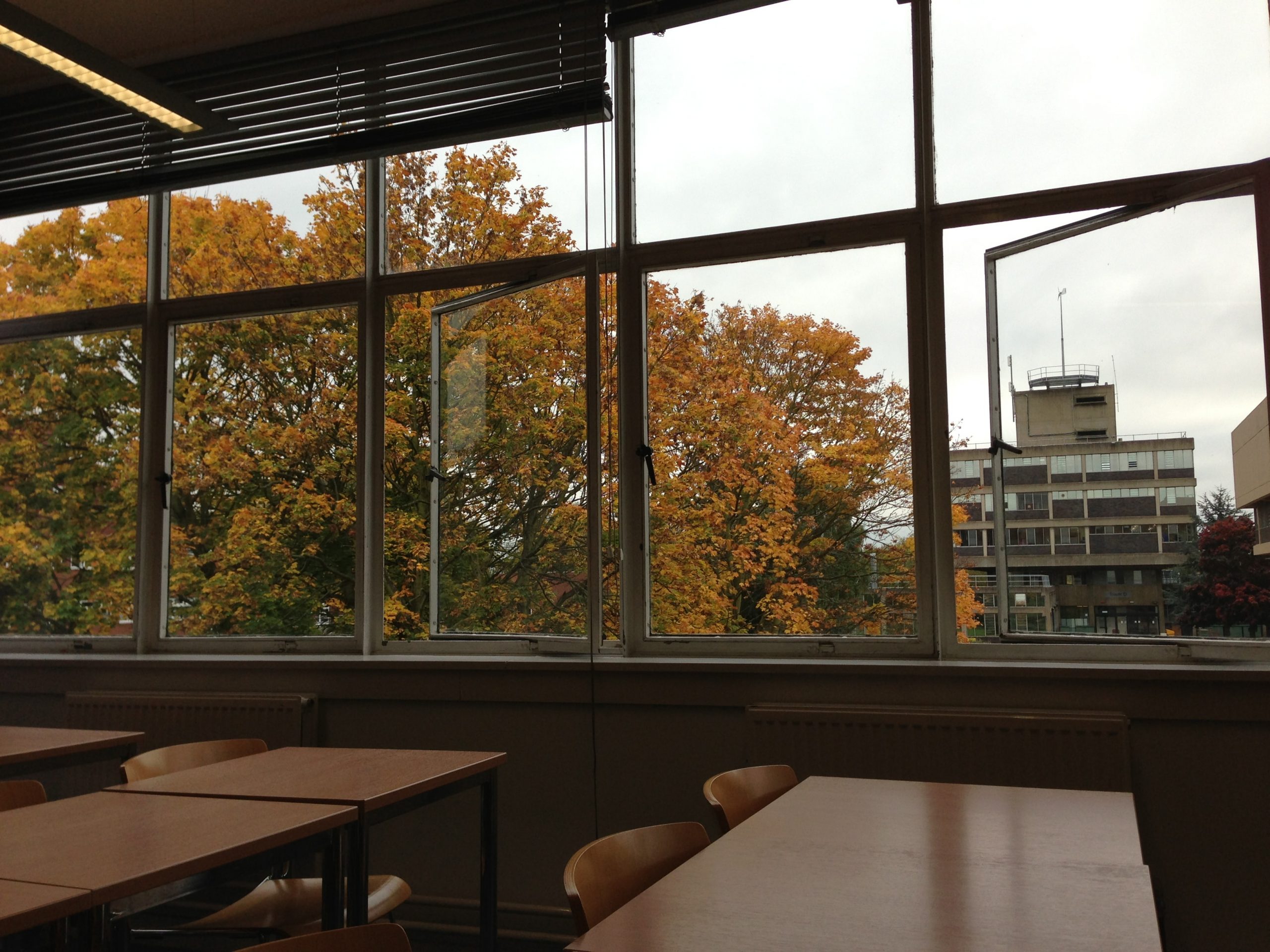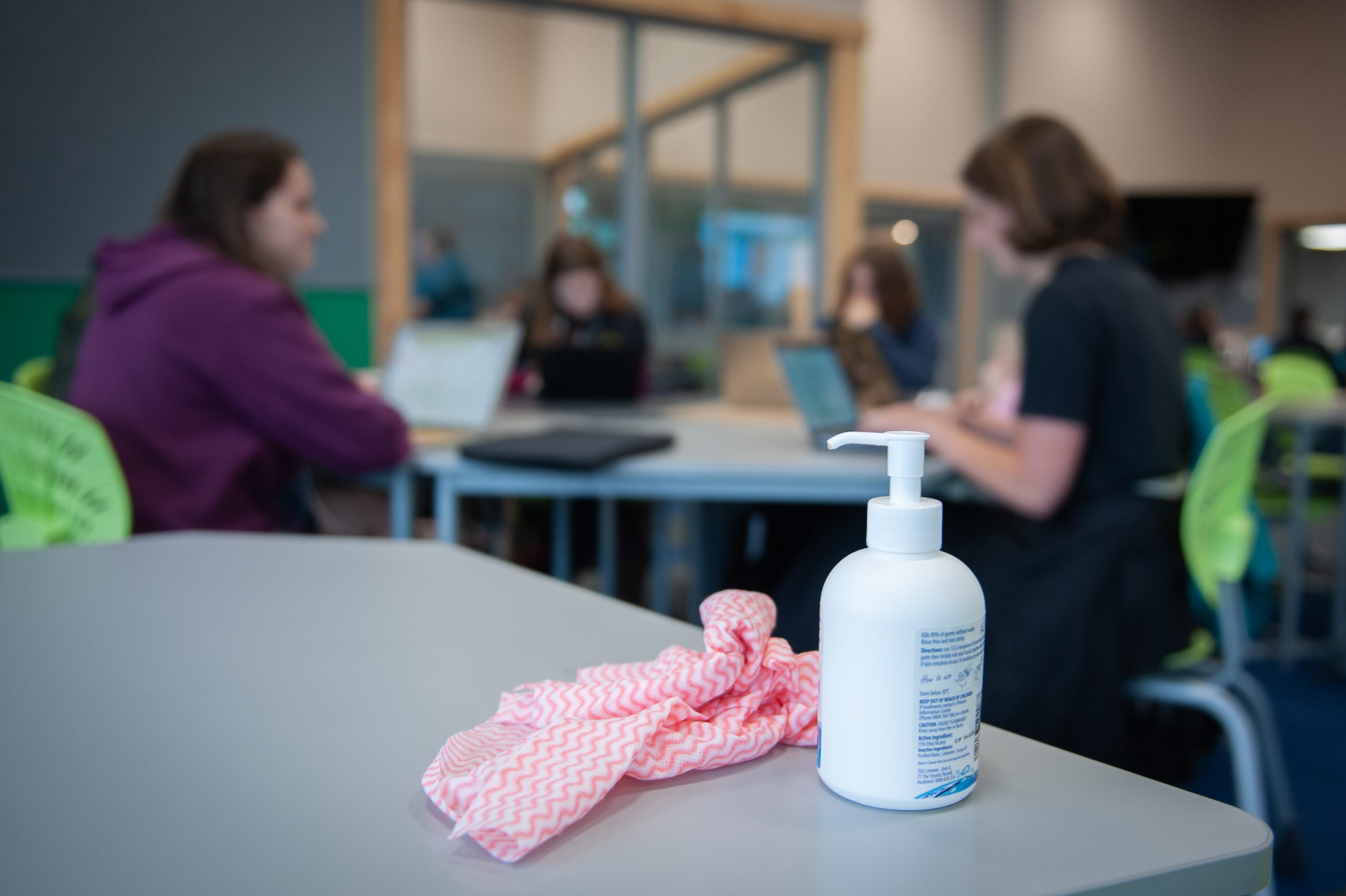Dr Rachel Webb, Dr Jin Russell, Dr Pip Anderson, Dr Emma Best, Dr Alison Leversha and Dr Subha Rajanaidu*
In this blog we describe the range of urgent measures that are needed to facilitate a safe return to schools in Auckland and other regions of the country where there is ongoing community transmission of COVID-19. These include very high vaccination coverage of staff and eligible students, improved ventilation in schools, mask guidance and physical distancing. A premature return to on-site learning in schools, particularly in areas of Auckland with low vaccination uptake, and current community cases, may contribute to further transmission of COVID-19, with devastating health and wellbeing outcomes for children, young people and their families.
Photo by zehua chen on Unsplash
The Auckland region of New Zealand is experiencing ongoing community transmission of SARS-CoV-2 B.1.617.2 (Delta variant). Since the beginning of the Delta outbreak in August 2021, almost 40% of all cases have occurred in children and young people under 20 years old, driven largely by transmission from adults to children within households and families.
Fortunately, the overwhelming majority of young children with COVID-19 experience only mild symptoms. Since the beginning of the Delta outbreak in NZ, there have been only a handful of hospital presentations among children. Older adolescents and children with obesity, pre-existing conditions and those living in economically deprived circumstances are at greater risk of severe COVID-19.
Whilst young children are at very low risk of transmission to other children or adults, the consequences of transmission are higher for children living in multi-generational households, particularly where there are elderly people, unvaccinated adults and people with chronic medical conditions. Vaccination uptake amongst Māori and Pacific peoples in their 20s and 30s (many of whom are parents of school-aged children) is currently among the lowest of any population group in the Auckland region.
Although international experience suggests very low risk of child-to-child transmission in schools, the transmission dynamics of Delta in NZ schools where large numbers of children (in some cases groups of up to 100) learn in open-plan modern learning environments (MLEs) is currently untested.
Prolonged school absence due to lockdowns is harmful to the social, physical and emotional wellbeing of children and teenagers, especially for those living in households affected by poverty, unstable housing, food insecurity, family violence and parental stress.
We request that the Ministries of Health and Education urgently prepare and disseminate clear and comprehensive guidance for school communities regarding the safe return to on-site learning. At a minimum, this plan needs to include the following elements:
1. Staff vaccination, for teachers and all adults visiting school sites
- With a preference for a staff vaccine coverage target of ≥ 90% prior to the commencement of on-site learning.
2. Regular surveillance testing of staff, as has already been implemented for many healthcare workers, regional border workers and other essential workers.
- Staff who work closely with children with pre-existing conditions that place them at increased risk of severe illness should have more frequent rapid antigen testing, if this testing modality is found to be accurate and feasible.
3. Guidance regarding unvaccinated staff, including requirements for strict adherence to mask wearing at all times, regular surveillance testing and avoidance of high-risk close-contact activities (eg, singing indoors, sharing confined office spaces). Where feasible, schools may prefer to deploy unvaccinated staff to non-child-facing duties.
4. Intensive efforts to improve vaccination uptake among families prior to the re-opening of schools via culturally responsive, accessible vaccination services
- This includes parents, caregivers, and children >12 years, with a particular emphasis on areas with current community transmission and low vaccine uptake, and on supporting vaccination services led by and for Māori and Pacific peoples.
- Support for schools to host community vaccination events, allowing children and family members to be vaccinated together on site.
- Provision of anticipatory guidance regarding COVID-19 vaccination and the school-based vaccination programme in 2022 (especially if COVID-19 vaccinations become approved for 5 to 11 year olds).
5. Ventilation and physical distancing in schools
- Which may be achieved by outdoor classrooms, open windows, doors, formation of class bubbles, staggered opening hours and break times, taking activities outside where possible. Schools may require urgent additional funding to create safe outdoor learning spaces (shade sails, marquees, etc). See here for further details on improving ventilation in schools.
- A rapid evidence review and consideration of funding indoor air CO2 monitoring.
- Funding and roll-out of the above initiatives should be prioritised for schools located in high-risk communities where there is active community transmission of COVID-19.
6. Guidance regarding the safe resumption of sports, music, drama and other extra-curricular activities, and before and after school care programmes (OSCAR).
7. Guidance regarding masks / face coverings in schools for staff and students
- Whilst mandates may be appropriate for staff and students >12 years old, flexible approaches are likely to be required for younger children.
8. Clarification of public health responses and the approach to identification and management of COVID-19 contacts within schools, in the event that a student or adult is found to have COVID-19 or deemed to be a close contact of confirmed case.
9. Additional financial support and employment protection for parents who need to take time off work when their children require COVID-19 testing and isolation.
10. Additional resources for schools to support children with health issues who may not return to on-site learning immediately, and for children who are required to stand down from school following exposure to COVID-19. Medical exemption certificates may be required.
Photo by Luke Pilkinton-Ching, University of Otago Wellington
Re-opening guidance and operational plans must be informed by Māori and Pasifika health and education leaders, in order to be workable and equitable.
Schools are at the heart of our communities. Improving child wellbeing by enabling the safe transition back to school, provides a strong pro-vaccination message and motivation for parents, caregivers, school staff and eligible students.
The proposed school re-opening date of 18 October is rapidly approaching, and it is unclear whether a comprehensive plan for schools can be formulated and implemented in this short timeframe. A clear plan, which names mitigations for preventing transmission within schools and ensures very high staff vaccination rates, is recommended before re-opening schools. Additional time may be required in order to achieve this. However, the considerable harm to children and teenagers caused by prolonged lockdowns also needs to be acknowledged, and the need for a well-informed operational guidance document is urgent.
Unless a clear plan is communicated, parents, caregivers, staff and students themselves will be fearful and reluctant to return to school. This was experienced by many schools in South Auckland following the 2020 lockdowns and is likely to be amplified with heightened community fear of the Delta variant.
The Victorian Government’s recently released staged re-opening plan and operational guidance for schools provide a useful example for the New Zealand Ministries of Health and Education.
A premature return to on-site learning, particularly in areas of Auckland with low vaccination uptake and current community cases, may contribute to further transmission of COVID-19, with devastating health and wellbeing outcomes for children, young people and their families.
* Author affiliations: Dr Rachel Webb, Dr Emma Best, and Dr Alison Leversha are with the Department of Paediatrics: Child and Youth Health at the University of Auckland. Dr Jin Russell (available for media contact: jin.russell@auckland.ac.nz) is with the School of Population Health at the University of Auckland. All work at Starship Children’s Hospital: Dr Rachel Webb and Dr Emma Best are paediatric infectious diseases physicians, Dr Alison Leversha is a community paediatrician and Dr Jin Russell is a developmental paediatrician. Dr Rachel Webb also works at Kidz First, Counties Manukau District Health Board. Dr Philippa Anderson is a Public Health Physician at Counties Manukau District Health Board. Dr Subha Rajanaidu is a Public Health Physician at Auckland and Waitemata District Health Boards. Both are currently supporting the Auckland Regional Public Health Service (ARPHS) COVID-19 response.




It feel just so unsafe to return to school after seeing that delta variant has effected much of the younger generation so much in this out break. People have to consider that some school are much larger in size than other, in confined spaces the risk of exposure is just too high. I personally believe that schools in Auckland should not open at this current situation. Is just to risky.
Likewise agree Auckland schools cannot safely reopen this year. Detailed safety measures need to be defined, scrutinised, agreed and investment made to implement. If Auckland schools do open Delta cases numbers risk exponential growth, devastating school communities, especially large and diverse schools and locking the healthcare system.